新目标七年级英语时态汇总
初一英语常见的时态讲解及例句
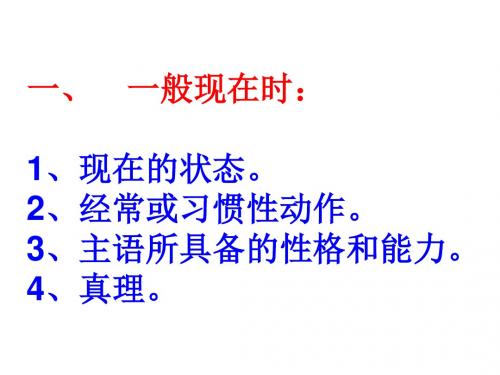
练习: 1. Jim ______(take) photos in the park now. 2. Jim_______(not take) in the park now.
3. _____Jim_____(take) photos in the park now? Yes, he _____. No, he _______. 4. Where _________Jim ____________ photos now? In the park.
10.They _____(be) frห้องสมุดไป่ตู้m Canada They______(not speak) Chinese.
11. He wants _____ (be) tall.
1.我们正在吃晚餐。 We ___________________
2、我们每天6点起床。 We _________ at six every day.
4. You and I ___(not be) in Class Six. 5.___(be) there a supermarket on the Fifth Avenue? Yes, there_____ (be). 6. ____ her parent tall? No, he____.
1)His parents _______(watch) TV every night. 肯定句 2) My brother _________(do) homework every day. 3)His parents _______(not watch) every night.否定句 4)My brother________(not do)homework every day.
时态复习的思维步骤应是: 一时间、 二主语、 三动词。
七年级英语时态知识点总结
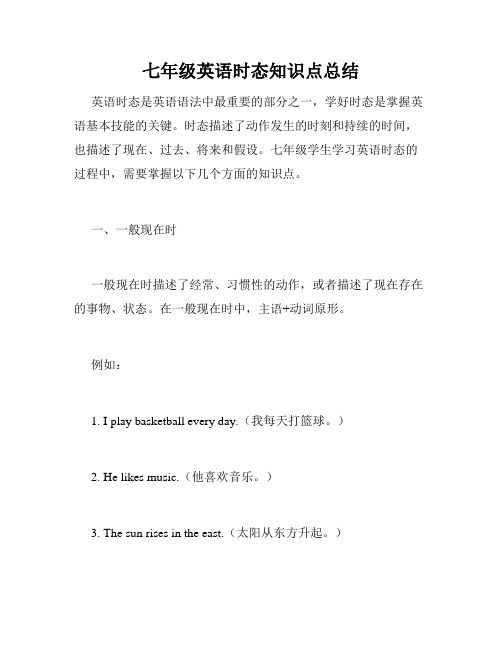
七年级英语时态知识点总结英语时态是英语语法中最重要的部分之一,学好时态是掌握英语基本技能的关键。
时态描述了动作发生的时刻和持续的时间,也描述了现在、过去、将来和假设。
七年级学生学习英语时态的过程中,需要掌握以下几个方面的知识点。
一、一般现在时一般现在时描述了经常、习惯性的动作,或者描述了现在存在的事物、状态。
在一般现在时中,主语+动词原形。
例如:1. I play basketball every day.(我每天打篮球。
)2. He likes music.(他喜欢音乐。
)3. The sun rises in the east.(太阳从东方升起。
)二、一般过去时一般过去时描述了过去某个时刻或者一段时间内发生的动作。
在一般过去时中,主语+动词过去式。
例如:1. They went to the beach last weekend.(他们上周末去了海滩。
)2. I studied English for three hours yesterday.(昨天我学习英语三个小时。
)3. She visited her grandparents last month.(上个月她去看望她的祖父母了。
)三、一般将来时一般将来时描述了将来会发生的动作或者事件。
在一般将来时中,主语+will/shall+动词原形。
例如:1. She will go to the movies with me tonight.(今晚她会和我一起去看电影。
)2. We shall visit our friends in London next month.(下个月我们将会拜访在伦敦的朋友。
)3. They will have a party on Saturday.(他们星期六会有一个派对。
)四、现在进行时现在进行时描述了正在进行中的动作。
在现在进行时中,主语+be动词+动词-ing。
例如:1. He is playing football with his friends now.(他正在和他的朋友们打足球。
七年级时态英语知识点总结
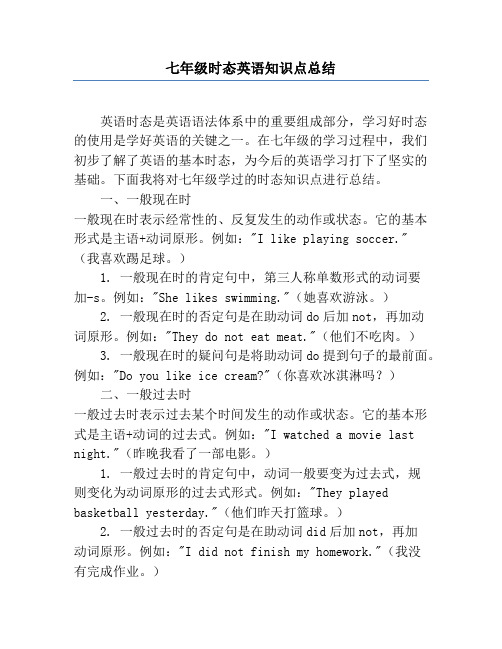
七年级时态英语知识点总结英语时态是英语语法体系中的重要组成部分,学习好时态的使用是学好英语的关键之一。
在七年级的学习过程中,我们初步了解了英语的基本时态,为今后的英语学习打下了坚实的基础。
下面我将对七年级学过的时态知识点进行总结。
一、一般现在时一般现在时表示经常性的、反复发生的动作或状态。
它的基本形式是主语+动词原形。
例如:"I like playing soccer."(我喜欢踢足球。
)1. 一般现在时的肯定句中,第三人称单数形式的动词要加-s。
例如:"She likes swimming."(她喜欢游泳。
)2. 一般现在时的否定句是在助动词do后加not,再加动词原形。
例如:"They do not eat meat."(他们不吃肉。
)3. 一般现在时的疑问句是将助动词do提到句子的最前面。
例如:"Do you like ice cream?"(你喜欢冰淇淋吗?)二、一般过去时一般过去时表示过去某个时间发生的动作或状态。
它的基本形式是主语+动词的过去式。
例如:"I watched a movie last night."(昨晚我看了一部电影。
)1. 一般过去时的肯定句中,动词一般要变为过去式,规则变化为动词原形的过去式形式。
例如:"They played basketball yesterday."(他们昨天打篮球。
)2. 一般过去时的否定句是在助动词did后加not,再加动词原形。
例如:"I did not finish my homework."(我没有完成作业。
)3. 一般过去时的疑问句是将助动词did提到句子的最前面。
例如:"Did you go to the park yesterday?"(你昨天去公园了吗?)三、一般将来时一般将来时表示将要发生的动作或状态。
初一英语时态总结
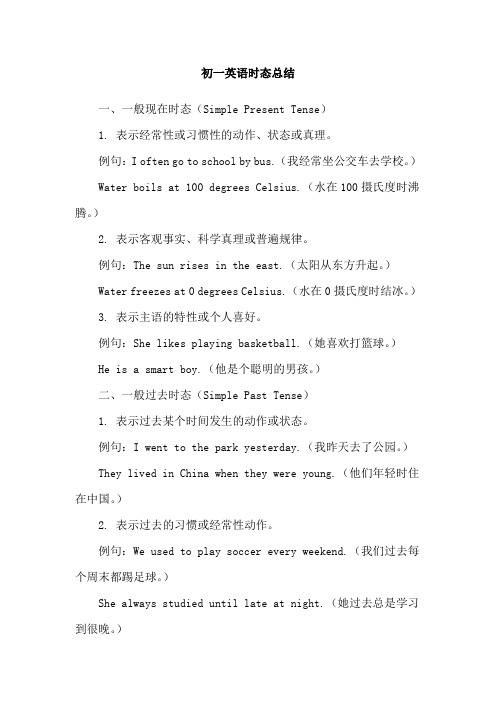
初一英语时态总结一、一般现在时态(Simple Present Tense)1. 表示经常性或习惯性的动作、状态或真理。
例句:I often go to school by bus.(我经常坐公交车去学校。
) Water boils at 100 degrees Celsius.(水在100摄氏度时沸腾。
)2. 表示客观事实、科学真理或普遍规律。
例句:The sun rises in the east.(太阳从东方升起。
)Water freezes at 0 degrees Celsius.(水在0摄氏度时结冰。
) 3. 表示主语的特性或个人喜好。
例句:She likes playing basketball.(她喜欢打篮球。
)He is a smart boy.(他是个聪明的男孩。
)二、一般过去时态(Simple Past Tense)1. 表示过去某个时间发生的动作或状态。
例句:I went to the park yesterday.(我昨天去了公园。
) They lived in China when they were young.(他们年轻时住在中国。
)2. 表示过去的习惯或经常性动作。
例句:We used to play soccer every weekend.(我们过去每个周末都踢足球。
)She always studied until late at night.(她过去总是学习到很晚。
)3. 表示过去的真理或规律。
例句:Dinosaurs existed millions of years ago.(恐龙存在于几百万年前。
)The Earth was flat according to ancient beliefs.(根据古代的信仰,地球是平的。
)三、一般将来时态(Simple Future Tense)1. 表示将来某个时间或在某个时间之后发生的动作或状态。
例句:I will visit my grandparents next week.(下周我会去看望我的祖父母。
七年级上册英语时态归纳
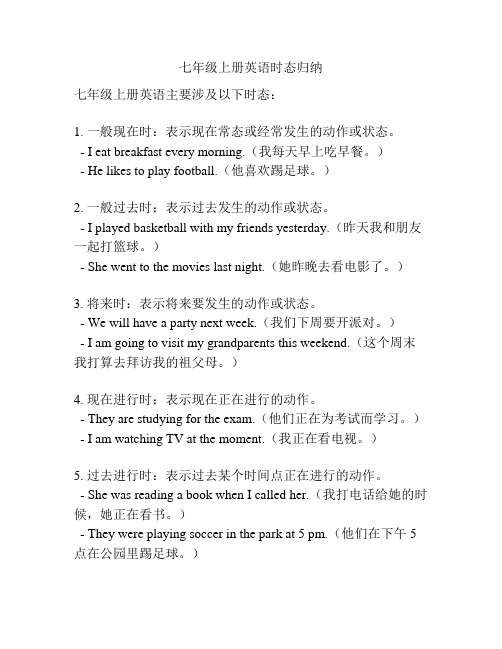
七年级上册英语时态归纳七年级上册英语主要涉及以下时态:1. 一般现在时:表示现在常态或经常发生的动作或状态。
- I eat breakfast every morning.(我每天早上吃早餐。
)- He likes to play football.(他喜欢踢足球。
)2. 一般过去时:表示过去发生的动作或状态。
- I played basketball with my friends yesterday.(昨天我和朋友一起打篮球。
)- She went to the movies last night.(她昨晚去看电影了。
)3. 将来时:表示将来要发生的动作或状态。
- We will have a party next week.(我们下周要开派对。
)- I am going to visit my grandparents this weekend.(这个周末我打算去拜访我的祖父母。
)4. 现在进行时:表示现在正在进行的动作。
- They are studying for the exam.(他们正在为考试而学习。
) - I am watching TV at the moment.(我正在看电视。
)5. 过去进行时:表示过去某个时间点正在进行的动作。
- She was reading a book when I called her.(我打电话给她的时候,她正在看书。
)- They were playing soccer in the park at 5 pm.(他们在下午5点在公园里踢足球。
)6. 现在完成时:表示过去发生的动作与现在产生的影响或结果。
- I have finished my homework.(我已经完成了我的作业。
)- She has lived in this city for ten years.(她在这个城市已经住了十年了。
)这些是七年级上册英语的主要时态,通过学习这些时态,你将能够更好地理解和运用英语语法。
初一英语四大时态
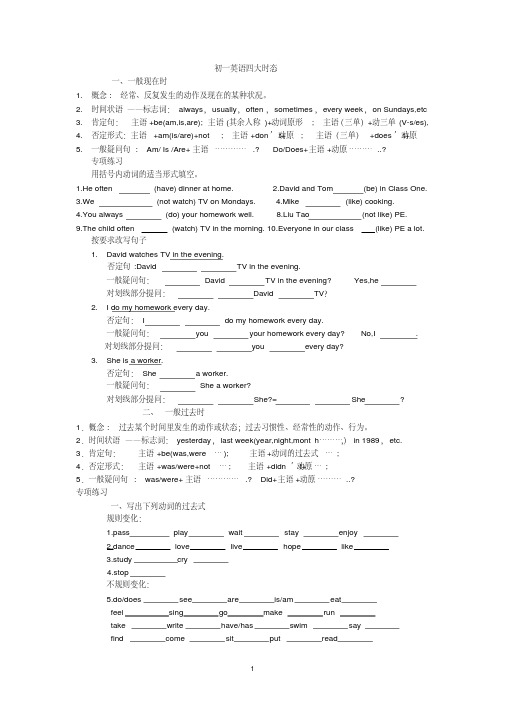
Today is Saturday. Tomorrow will be Sunday. 今天是星期六。明天(将)是星期日。
He will be thirty years old this time next year. 明年这个时候他就 (将 )三十岁。
3
3、问对方是否愿意做某事或表示客气地邀请或命令。
at school just now.
2.He
at the camp last week.
3.We
students two years ago. 4.They
on the farm a moment ago.
5.Yang Ling
eleven years old last year.
6.There
lots of grapes here
live
hope
like
3.study
cry
4.stop
不规则变化:
5.do/does
ห้องสมุดไป่ตู้
see
are
is/am
eat
feel
sing
go
make
run
take
write
have/has
swim
say
find
come
sit
put
read
1
二、用动词的适当形式填空( was/were/is ) .
1.I
her homework yesterday evening.
一般疑问句:
Ann
her homework yesterday
evening?No, 对划线部分提问:
. Ann
yesterday evening?
初一英语-四种时态一览表
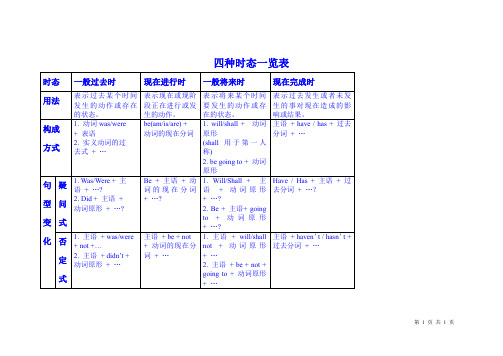
1. will/shall +动词原形
(shall用于第一人称)
2. be going to +动词原形
主语+ have / has +过去分词+…
句
型
变
化
疑
问
式
1. Was/Were +主
语+…?
2. Did +主语+
动词原形+…?
Be +主语+动词的现在分词+…?
1. Will/Shall +主语+动词原形+…?
2. Be +主语+ going to +动词原形+…?
Have / Has +主语+过去分词+…?
否
定
式
1.主语+ was/were
+ not +…
2.主语+ didn’t +
动词原形+…
主语+ be + not
+动词的现在分词+…
1.主语&2.主语+ be + not + going to +动词原形+…
主语+ haven’t / hasn’t +过去分词+…
四种时态一览表
时态
一般过去时
现在进行时
一般将来时
现在完成时
用法
表示过去某个时间发生的动作或存在的状态。
表示现在或现阶段正在进行或发生的动作。
表示将来某个时间要发生的动作或存在的状态。
表示过去发生或者未发生的事对现在造成的影响或结果。
初一英语四种时态讲解
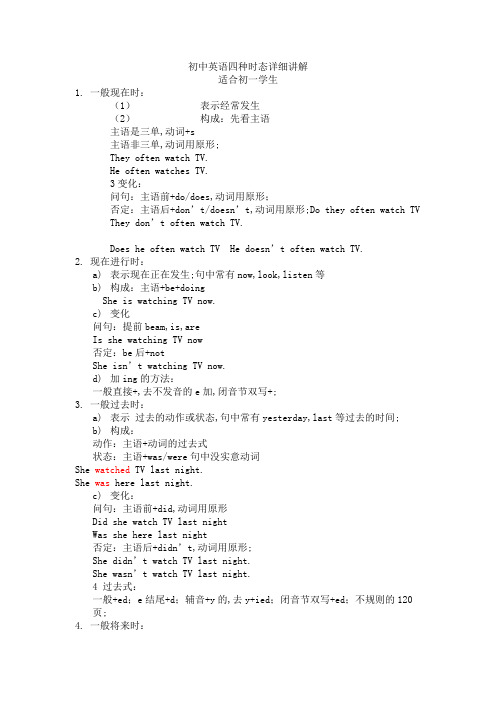
初中英语四种时态详细讲解适合初一学生1.一般现在时:(1)表示经常发生(2)构成:先看主语主语是三单,动词+s主语非三单,动词用原形;They often watch TV.He often watches TV.3变化:问句:主语前+do/does,动词用原形;否定:主语后+don’t/doesn’t,动词用原形;Do they often watch TV They don’t often watch TV.Does he often watch TV He doesn’t often watch TV.2.现在进行时:a)表示现在正在发生;句中常有now,look,listen等b)构成:主语+be+doingShe is watching TV now.c)变化问句:提前beam,is,areIs she watching TV now否定:be后+notShe isn’t watching TV now.d)加ing的方法:一般直接+,去不发音的e加,闭音节双写+;3.一般过去时:a)表示过去的动作或状态,句中常有yesterday,last等过去的时间;b)构成:动作:主语+动词的过去式状态:主语+was/were句中没实意动词She watched TV last night.She was here last night.c)变化:问句:主语前+did,动词用原形Did she watch TV last nightWas she here last night否定:主语后+didn’t,动词用原形;She didn’t watch TV last night.She wasn’t watch TV last night.4 过去式:一般+ed;e结尾+d;辅音+y的,去y+ied;闭音节双写+ed;不规则的120页;4.一般将来时:a)表示:将来 ,句中有表示将来的时间:tomorrow、next、soon,in twodays等b)构成A:主语+will+do任何人称B:主语+shall+do仅第一人称I,weC:主语+be going to +do 如:A:She will watch TV this evening.B:We shall watch TV this evening.C:She is going to watch TV this evening.c)变化问句:提前will/shall/beA:Will she watch TV this…B: Shall we watch TV …C: Is she going to watch …否定:在will /shall/be 后+notA: She won’t watch TV…B: We shall not watch… shan’tC: She isn’t going to watch…There is a meeting next week.There was a meeting yesterday.There will be a meeting next…=There is going to be a meeting next …。
- 1、下载文档前请自行甄别文档内容的完整性,平台不提供额外的编辑、内容补充、找答案等附加服务。
- 2、"仅部分预览"的文档,不可在线预览部分如存在完整性等问题,可反馈申请退款(可完整预览的文档不适用该条件!)。
- 3、如文档侵犯您的权益,请联系客服反馈,我们会尽快为您处理(人工客服工作时间:9:00-18:30)。
新目标七年级英语时态汇总作者:佚名文章来源:网络点击数:142 更新时间:2013-2-5 0:02:29一般现在时【定义】一般现在时表示现在经常反复发生的动作、存在的状态或习惯性的动作。
即描述我们日常生活中的衣食住行等活动。
【用法】(1) 在实际应用中,一般现在时常与以下时间状语联用:always, usually, often, sometimes, every week (day, year, month, once a week, on Sundays ……例句:He usually plays football on Sundays.(2)没有时间状语,可以分以下四种类型:A.be型这一类型由be动词+名词、形容词、副词、代词、数词或介词短语等一起构成谓语,表示主语的个性、特征或状态。
如:①I am a student.(主语+be动词+名词) ②They are hungry.(主语+be动词+形容词)③He is out.(主语+be动词+副词) ④That pen is mine.(主语+be动词+代词)⑤I am fifteen.(主语+be动词+数词) ⑥The bike is under the tree.(主语+be动词+介词短语)B.do型do型由行为动词充当谓语,表示经常性或习惯性的动作,其构成为“主语+动词原形或动词第三人称单数形式”。
如:①I know it. ②He believes me.C.there be型there be型句子表示“某地存在…”,其构成为“there be+主语+其他”,表示客观事实。
用法遵循“就近原则”,即主语是单数或并列主语中的第一个主语是单数,则用there is;主语是复数或并列主语中的第一个主语是复数,则用there are。
如:(1)There is an eraser on the teacher's desk.(主语an eraser是单数)(2)There is an orange,five apples and eight bananas in the bag.(并列主语中的第一个主语an orange是单数)D.情态动词型情态动词型句子的构成为“主语+情态动词+动词原形”,情态动词和动词原形一起构成谓语,表示说话人对所叙述的动作或状态的看法。
如:①He can speak a little English.(can+speak)②May I have a book, please?(may+have)练习】一般过去时【定义】一般过去时表示过去某个时间发生过了的动作或存在过的状态。
即描述已经发生过了的事情。
【时间标志性词】 yesterday,the day before yesterday, in 2010, (three days) ago, last (night, month, year, weekend), just now, 另一般过去时也表示经常或反复发生的动作,常和often, always等表示频率的时间状语连用。
例如: I always went to school on foot last year. 去年我通常走路去上学。
【用法】A.be型这一类型由be动词(was和were)+名词、形容词、副词、代词、数词或介词短语等一起构成谓语,表示主语以前或过去的个性、特征或状态。
如:①I was a student ten years ago.(主语+be动词+名词) ②They were hungry just now.(主语+be动词+形容词)③The bike was under the tree yesterday.(主语+be动词+介词短语)④It was rainy last Sunday. ⑤They were very happy at Kangkang’s birthday party.B.did型did型由行为动词过去式充当谓语,表示以前做过的某事,其构成为“主语+动词过去式动词”。
如:①I knew him when I was young. ②He believed me at that time .C.there be(was/were)型there be型句子表示“某地曾经存在…”,其构成为“there be(was/were)+主语 +其他”。
用法遵循“就近原则”,D.情态动词型情态动词型句子的构成为“主语+情态动词过去式could+动词原形”,情态动词过去式和动词原形一起构成谓语,表示主语过去或曾经能做的事情。
如:①He could speak a little English last year.(could+speak)②What could she do when he was ten.【练习】一、用所给词的适当形式填空。
(Be动词)1. I __________(be) a little girl at that time.2. When __________(be) you born?3. Maria __________(be) born in Cuba.4. The weather yesterday __________(be) very cold.5. They __________(be) very happy at Kangkang’s birthday party yesterday.6. What __________(be) the date the day before yesterday?7. __________(be) you at home a moment ago?8. Where __________(be) your parents last Saturday?9. My mother __________(be not) in Chongqing last month.10. How __________(be) the weather this morning?二、用所给词的适当形式填空。
(情态动词)1. Jane __________(can) speak Chinese well when she was only five.2. __________(can) they dance the disco last year?3. I __________(can not) sleep well last night.4. What __________(can) you do just now?三、用所给词的适当形式填空。
(实义动词)1. I __________(like) reading books before. But now I don’t.2. She __________(watch) TV late yesterday evening.3. We __________(clean) up our classroom a moment ago.4. __________ they __________(have) any bread this morning?5. What __________ you __________(do) the day before yesterday?6. Tom __________(go) to visit the Great Wall last year.7. Mr. Wang __________(sing) an English song just now.8. __________ Lin Tao have a good time at the party last Sunday?9. We __________(not porform) ballet yesterday. We __________(recite) a poem.10. The wind yesterday __________(blow) strongly.四、句型转换。
(Be动词)1. I was born in a small town.(变为一般疑问句) __________ you __________ in a small town?2. Sam was a little boy at that time.(变为否定句)Sam __________ __________ little boy at that time.3. His friends were in the library just now.(对划线部分提问)__________ __________ his friends just now?4. Were they very happy yesterday?(作否定回答) No, __________ __________.5. Was your brother born in Chongqing?(作肯定回答)Yes, __________ __________.五、句型转换。
(情态动词)1. I could sing English songs when I was five.(变一般疑问句)__________ you __________ English songs when you were five?2. The boy could ride a bike last year.(变否定句)The boy __________ __________ a bike last year.3. They could play a game yesterday.(对划线部分提问) What __________ they __________ yesterday?4. Could your friends cook food last Sunday?(作肯定回答) Yes, __________ __________.六、句型转换。
(实义动词)1. I went to Sichuan with my friends during summer holidays.(变否定句)I __________ __________ to Sichuan with my friends during summer holidays.2. She recited a poem at Kangkang’s birthday party.(变一般疑问句)__________ she __________ a poem at Kangkang’s birthday party?3. They did their homework half an hour ago.(变否定句)They __________ __________ their homework half an hour ago.4. Tom sang a song beautifully yesterday.(对划线部分提问)What __________ Tom __________ yesteray?5. Jim took many pictures in winter holidays.(变一般疑问句)__________ Jim __________ many pictures in winter holidays?6. Did the kid hurt himself just now?(做否定回答)No, __________ __________.7. They knew the girl in blue well?(对划线部分提问) Who __________ they __________ well?8. I forgot to close the door yesterday evening.(对划线部分提问)What __________ you __________ to do yesterday evening?现在(正在)进行时【定义】现在(正在)进行时表示说话的瞬间正在进行或发生的事情。
